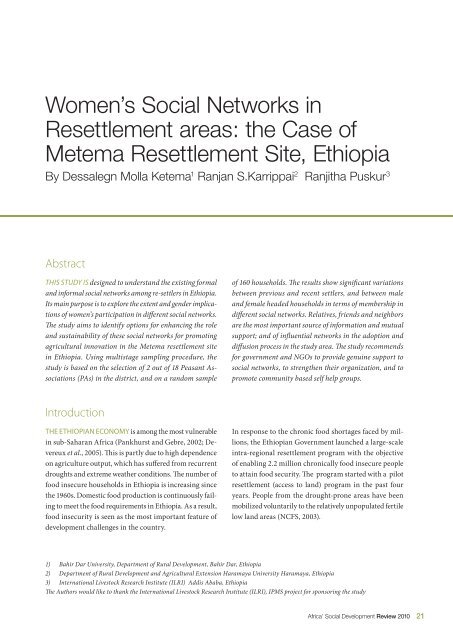The African Social Development Review - United Nations Economic ...
The African Social Development Review - United Nations Economic ...
The African Social Development Review - United Nations Economic ...
You also want an ePaper? Increase the reach of your titles
YUMPU automatically turns print PDFs into web optimized ePapers that Google loves.
Women’s <strong>Social</strong> Networks inResettlement areas: the Case ofMetema Resettlement Site, EthiopiaBy Dessalegn Molla Ketema 1 Ranjan S.Karrippai 2 Ranjitha Puskur 3AbstractTHIS STUDY IS designed to understand the existing formaland informal social networks among re-settlers in Ethiopia.Its main purpose is to explore the extent and gender implicationsof women’s participation in different social networks.<strong>The</strong> study aims to identify options for enhancing the roleand sustainability of these social networks for promotingagricultural innovation in the Metema resettlement sitein Ethiopia. Using multistage sampling procedure, thestudy is based on the selection of 2 out of 18 Peasant Associations(PAs) in the district, and on a random sampleof 160 households. <strong>The</strong> results show significant variationsbetween previous and recent settlers, and between maleand female headed households in terms of membership indifferent social networks. Relatives, friends and neighborsare the most important source of information and mutualsupport; and of influential networks in the adoption anddiffusion process in the study area. <strong>The</strong> study recommendsfor government and NGOs to provide genuine support tosocial networks, to strengthen their organization, and topromote community based self help groups.IntroductionTHE ETHIOPIAN ECONOMY is among the most vulnerablein sub-Saharan Africa (Pankhurst and Gebre, 2002; Devereuxet al., 2005). This is partly due to high dependenceon agriculture output, which has suffered from recurrentdroughts and extreme weather conditions. <strong>The</strong> number offood insecure households in Ethiopia is increasing sincethe 1960s. Domestic food production is continuously failingto meet the food requirements in Ethiopia. As a result,food insecurity is seen as the most important feature ofdevelopment challenges in the country.In response to the chronic food shortages faced by millions,the Ethiopian Government launched a large-scaleintra-regional resettlement program with the objectiveof enabling 2.2 million chronically food insecure peopleto attain food security. <strong>The</strong> program started with a pilotresettlement (access to land) program in the past fouryears. People from the drought-prone areas have beenmobilized voluntarily to the relatively unpopulated fertilelow land areas (NCFS, 2003).1) Bahir Dar University, Department of Rural <strong>Development</strong>, Bahir Dar, Ethiopia2) Department of Rural <strong>Development</strong> and Agricultural Extension Haramaya University Haramaya, Ethiopia3) International Livestock Research Institute (ILRI) Addis Ababa, Ethiopia<strong>The</strong> Authors would like to thank the International Livestock Research Institute (ILRI), IPMS project for sponsoring the studyAfrica’ <strong>Social</strong> <strong>Development</strong> <strong>Review</strong> 201021
















